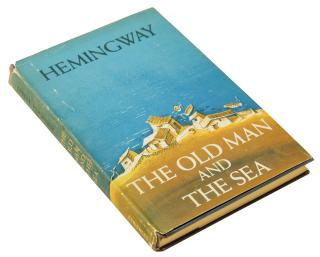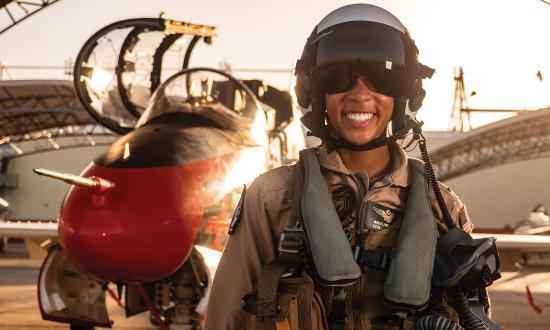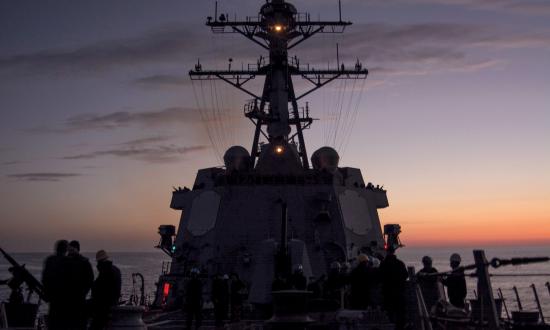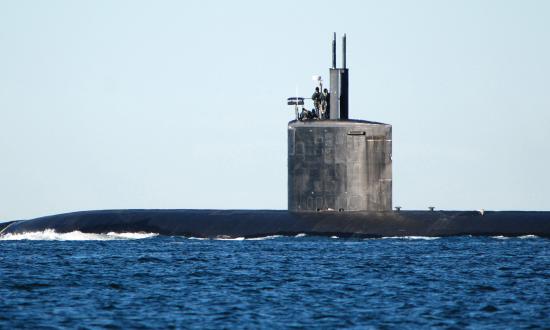Courage, commitment, and humility—some of the greatest virtues of the profession of arms—are illustrated masterfully, yet obscurely, by Ernest Hemingway in The Old Man and the Sea. While many Americans are exposed to this Pulitzer Prize-winning classic novella in grade school, I did not pick it up until the final months of my service as a Marine company commander. By the time I had finished the short book, replete with invaluable leadership lessons, I was disappointed in myself for not having read it before taking command. I was even more troubled—in the wake of my departing change of command—by my inability to connect my leadership experiences in command to the story’s deeper meaning concerning the cornerstones of professionalism.
Exhibit Courage Daily
fish” story; it offers lessons on commitment
and courage as well. Alamy
Unlike so many of the classic stories that provide characters with rare pedestals from which to achieve greatness—battle, tragedy, romance—the old man, Santiago, sets sail under the most mundane of pretexts. After 84 days without a catch, he heads out for what could easily prove to be another day of despair. The absence of his trusted first mate, who is unable to accompany him, is the only thing unique about Santiago’s fateful voyage. After mustering the courage to go alone, he rows into the sea in a small boat, undeterred by the endless frictions of life. Little does he know, he is bound to spend the next two days afloat, battling a gargantuan marlin, only to lose it to a school of sharks in the end.
Even with the benefit of hindsight, it is doubtful that Santiago would have stayed home rather than partake in the once-in-a-lifetime experience. After all, fishing is his chosen profession, and courage and passion are cornerstones of professionalism.
Leaders must live courageously, acknowledging that even the most mundane decisions have the potential to change the lives of their followers. Santiago’s decision to set off alone is not an example of courage in the face of calamity. Instead, it symbolizes one of the tens, if not hundreds, of routine yet important decisions that leaders face daily. Each of these instances requires the application of moral and physical courage to make the best decision often in a routine context. Leaders, after all, retain an obligation to use courage as a guide because followers trust them to act with honor and integrity at all times. Similarly, they must also remember that greatness is never preordained, and once-in-a-lifetime opportunities typically arise unheralded. Santiago sets out without any indication that he is destined to catch an incredible fish.
Garner Steadfast Commitment
After clearing the bay, Santiago casts his handline and falls into his daily routine. In a short time, his line goes taut, and he realizes that the fish on the other end is larger than any he has ever battled before. A mix of passion, mindfulness, and commitment enables him to persist in fighting it for the better part of two days and a night without so much as a glimpse of the animal. Finding himself in the midst of a once-in-a-lifetime opportunity, he accepts great risk in continuing a fight that drags him farther from port with limited provisions.
Just as with Hemingway’s old man, military leaders must remain committed to their organizations, missions, and comrades-in-arms as inextricable elements of the profession. Doing so requires the steadfastness to adhere to the moral and statutory obligations that accompany the trust and confidence bestowed on them. They must do so in extreme and tedious situations alike, always mindful of the potency of snares such as misplaced loyalty, self-interest, and fatigue. The profession of arms also demands diligence in seeing things through to the end, in the same way that Hemingway’s aged fisherman battled the weather, schooling sharks, and his inner turmoil to return home with the fish.
Find Grace and Humility
When the Santiago returns to port with little more than the fish bones the sharks spared him, he does not pout, yell, or dwell on his great loss. He recognizes instead that he can do little to change the situation, and he returns home, where he falls fast asleep, exhausted after giving the full measure in his battle with the fish. Above all, the old man demonstrates the humility and grace of a great leader in handling whatever life offers him.
At first glance, the ending of the story seems anticlimactic, an all too Hemingway-like way to close a literary masterpiece. On deeper reflection, however, the power of the ending exists in what Hemingway leaves unsaid. That is precisely the point I found myself pondering after awakening from a nap in the hours following my change-of-command ceremony. I finally understood the old man in the context of the profession of arms.
For the first time in a year and a half, I awoke to a cellphone without any missed calls or unread messages. I was not worried about liberty incidents or counseling sessions or whether trucks were still on the road. The Marine Corps had absolved me of those responsibilities and obligations hours earlier. Recognizing that my big fish was gone, I turned to my wife and told her that I finally understood that The Old Man and the Sea encapsulates the ultimate truth in life—that all things will pass. I realized that I was the old man, and that my big fish, the company of Marines that I had loved so much, was gone for good.
When I finally mustered enough courage to pry myself off the couch, I gathered my sons and took them camping on the beach behind our house with some friends. That night, we discussed the revelation and debated what the old man did the morning after the story left off. We agreed that he inevitably rowed back out to sea and started anew in the search for the greatest fish of his life. After all, fishing was his passion and his profession.
Life’s transitory nature makes it imperative for leaders to make the most of every opportunity, particularly those that put them in places to leave an impact on the lives of others. Our big fish are never actualized in their totality until they are gone. This truism necessitates the humility to see the big fish for what they are and decipher their importance in the context of life. Good leaders must follow Santiago’s example by appreciating that the big fish—which varies in size, composition, and duration in each individual case—represents their ephemeral experiences along the journey of life. The Old Man and the Sea demonstrates that leaders, regardless of rank or position, need the courage to do what is best, the commitment to stay the course, and the humility to recognize their big fish in life.







